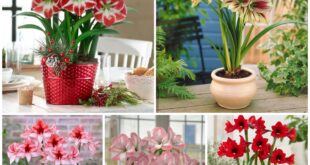Have you ever found yourself slightly attracted to the color blue? There’s a reason for that. Firstly, it is a basic color, secondly, it can relax the senses.
The blue color represents serenity and wisdom and surrounds us everywhere in nature – in the endless sky and in the sea.
Blue flowers in the garden also add positivity to the outdoor space and create an elegant focal point as their blooms are among the rarest to be seen in traditional landscaping.
Maybe you didn’t know that the blue flowers are actually a mixture of plant pigments that reflect light to create the illusion of true blue.
This interesting fact will certainly make you want to grow blue flowers even more. And while they’re rare, there are still plenty of ways to enjoy your own serene blooms.
And because they are gentle and require special care, they should be grown in their own containers. Let’s see what they are!
1. Aster
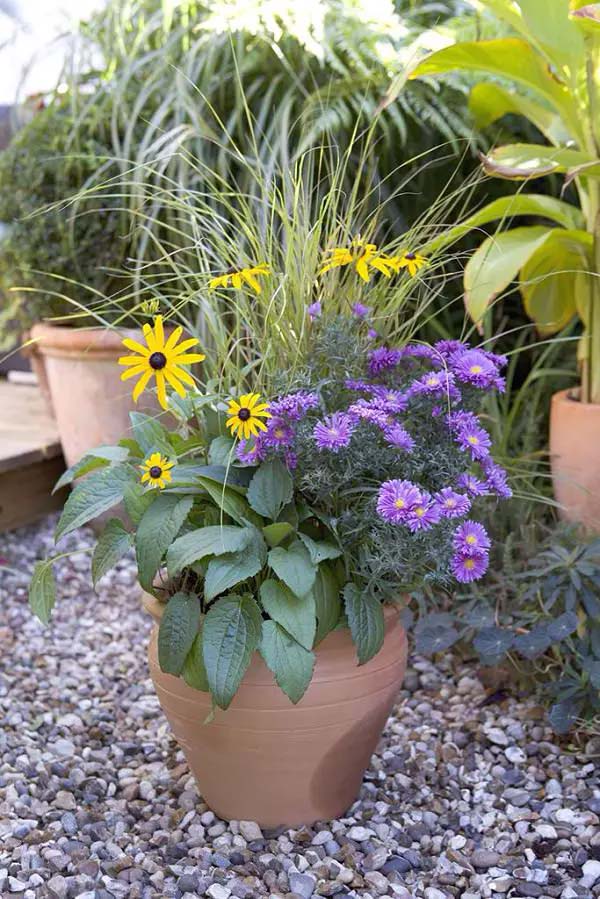
Aster likes summer, but not hot summer. You may have seen it in many colors, but it can also bloom in blue. It usually grows short, but there are also taller varieties.
The flowers develop in summer and autumn.
2. Balloon flower
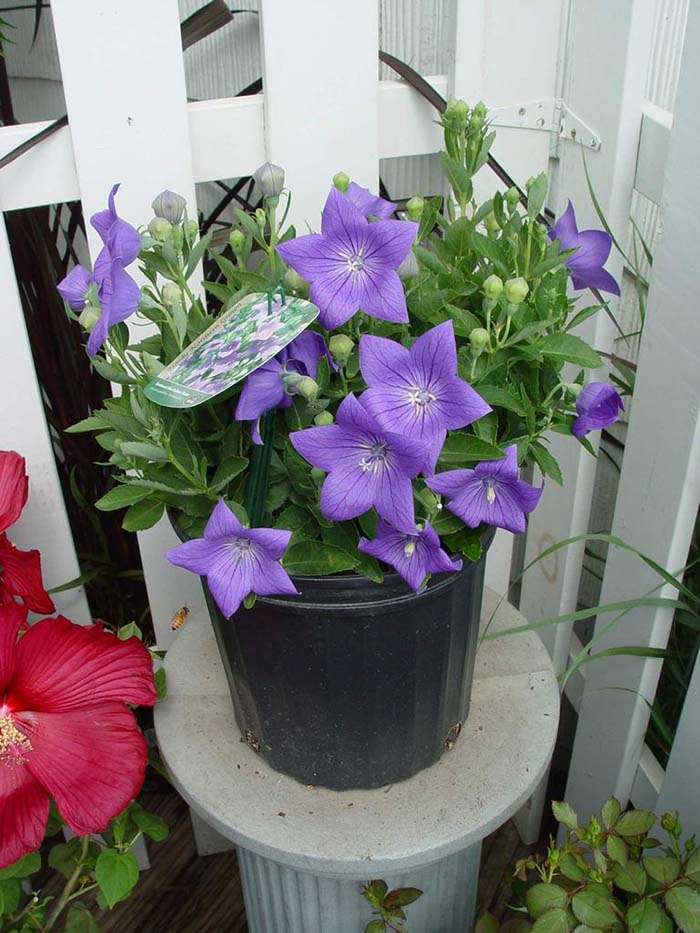
Suitable for cold climates
Platycodon grandiflorus, also called balloon flower, has unopened flower buds that resemble balloons.
When opened, the shape turns into a colorful star. You can grow pink, white, and blue balloon flowers on the ground and in pots.
It is important that the flower is well lit in the first half of the day, but remains in the shade in the warmer afternoon hours.
3. Bluebell
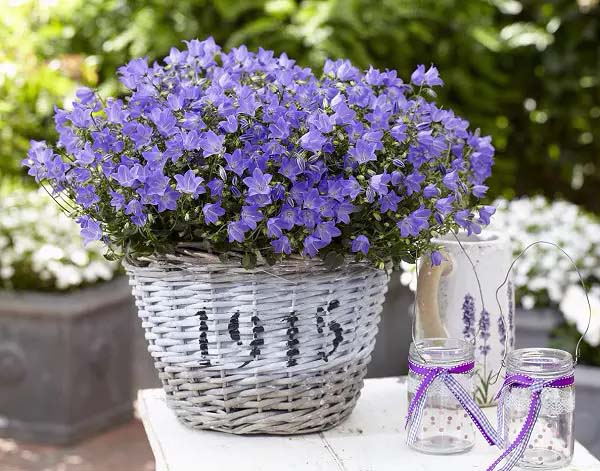
Campanula is a great flower that brings joy with its small bell-shaped flowers that form a cluster. You can see it in shades of pink, purple, white and blue.
It looks fantastic in a rock garden, but growing in a small container creating the illusion of an explosion of flowers is also extremely attractive.
4. Beth’s Blue
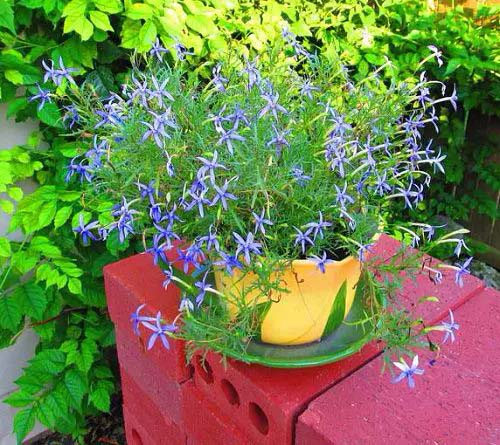
The flowers of Beth’s Blue or Isotoma axillaris look like stars in blue. Its center is colored yellow and rests on medium green foliage. It is usually preferred in combination with other flowers that need a background to stand out, but it also stands out perfectly on its own.
If you would like to have your own star-shaped blue flower, choose a potting mix that ensures easy drainage and place it in a location with sun and partial shade.
5. Blue Daisy
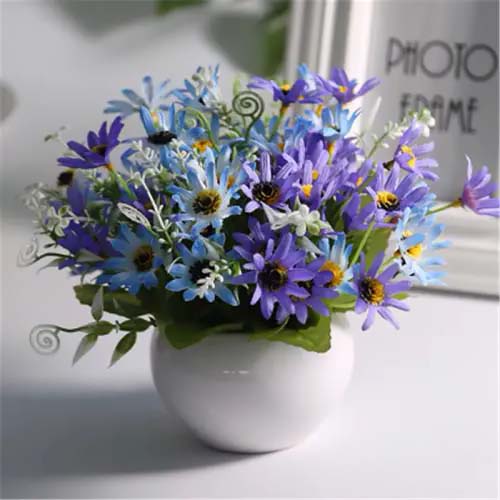
Blue daisies are adorable and so sweet. The yellow center makes it look like a sun spreading its blue rays.
They can be grown from seeds and cuttings in well-drained soil and a location with plenty of sunlight.
6. Blue fan flower
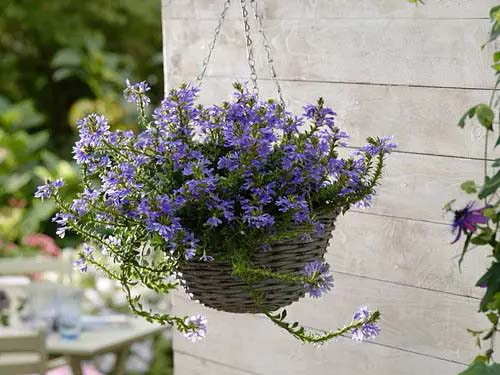
Blue fan flower and fairy fan flower are one and the same species. Because of the flowering tendrils, it looks amazingly beautiful in the container.
Hung on the porch or around the fence, it creates a layer of green with small blue, fan-shaped flowers.
As for the best environment, make sure there is enough sunlight and shade during the hottest hours.
7. Blue phlox
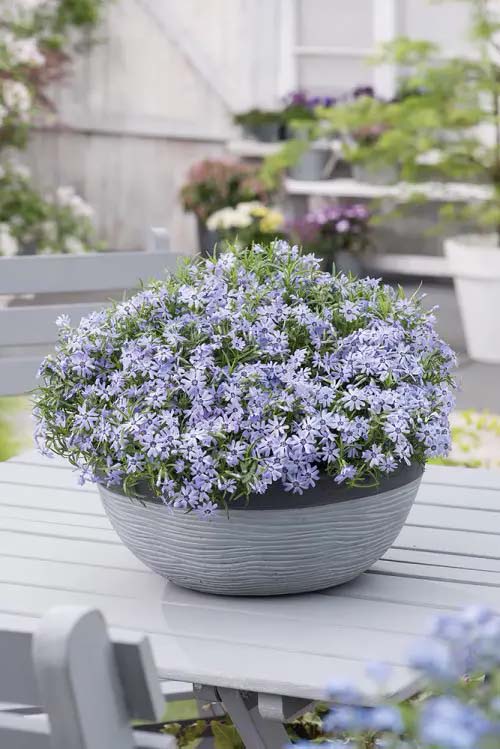
Blue phlox flowers bloom from early to late spring.
It smells fantastic, reminiscent of lavender, and performs well when grown in containers filled with well-drained soil.
8. Brunnera
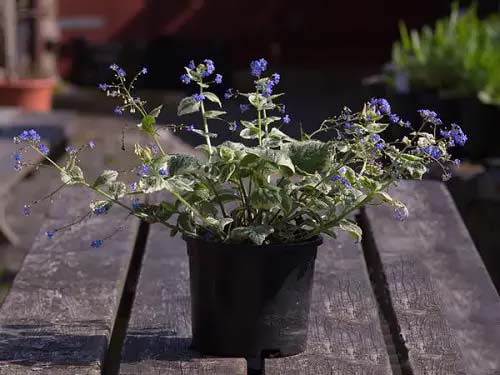
The flowers of Brunnera are light blue and if you are not nearby you might miss them.
As you get closer, you will see and fall in love with the heart-shaped leaves and soft petals of the blue flowers.
9. Clematis
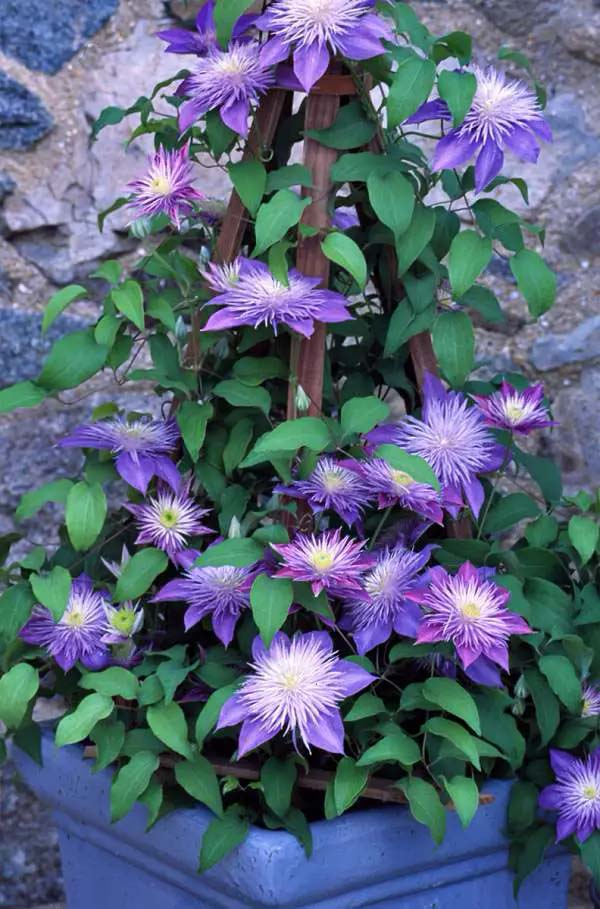
It is possible to grow clematis in a container if it is large enough for the roots to develop.
The variety of colors is diverse, as are the blue types of clematis. When choosing the best spot, make sure there is plenty of sun and prepare a trellis for the climb.
10. Columbine
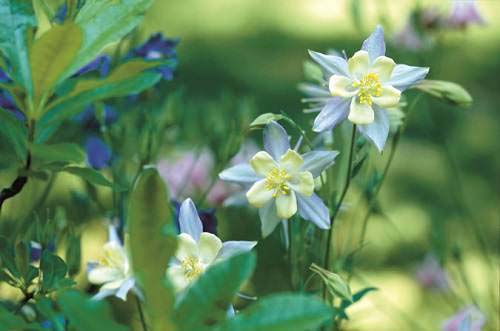
This is one of the most unpretentious blue flowers. It can grow and perform equally well in colder and warmer climates.
The flowers are very interesting – blue petals form a star bearing yellow stamens. Columbine prefers sunny locations and regular watering.
11. Cornflower (Bachelor Button)
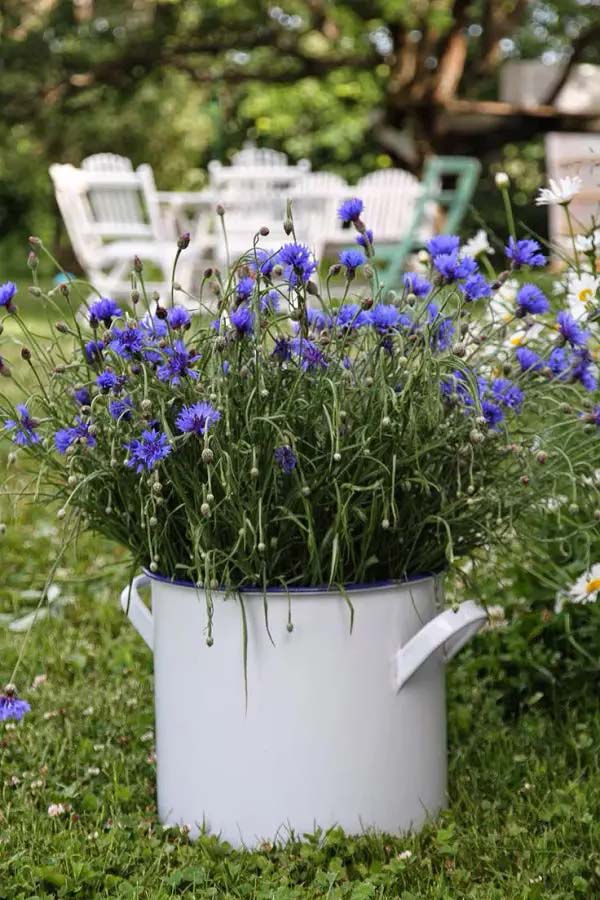
This is a wildflower cultivated in private gardens for its charming blue clusters. Placing it in your garden will give it a farmhouse look that will bring back fond childhood memories.
Another advantage of the cornflower is that it is very easy to care for. In the wild, of course, you don’t need any care and it still feels good.
12. Delphinium
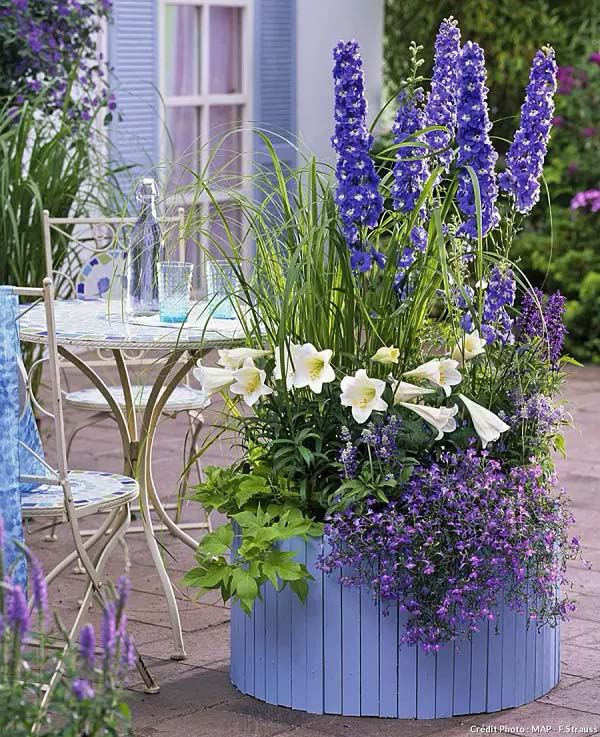
Delphiniums look great in combination with shorter and cascading flowers. They give the floral arrangement height and a lot of charm thanks to the rare blue color of its flowers.
Although we are used to seeing it as a border flower, it can also be successfully grown in containers.
13. Dwarf morning glories
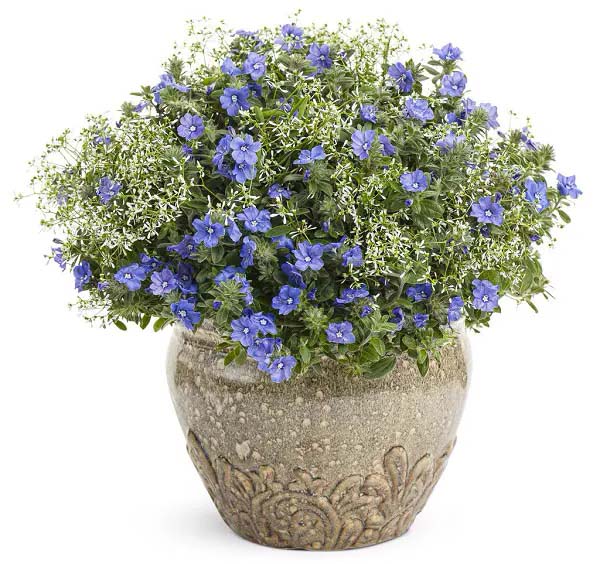
This flower prefers the warm climate where the sun shines directly on it. Also known as dwarf morning glory, the flower forms an adorable green clump topped with small blue flowers.
Because of the way morning glory grows, it looks fantastic in both regular flower pots and hanging baskets.
14. Flax flower
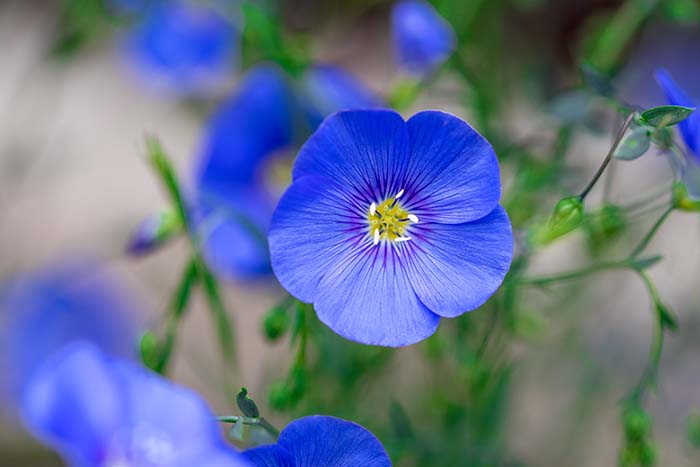
The flax flower is originally from California and blooms all summer long. It has five petals growing on thin stems.
An interesting fact is that this plant produces flax seeds, which are a source of lignans.
15. Forget-me-nots
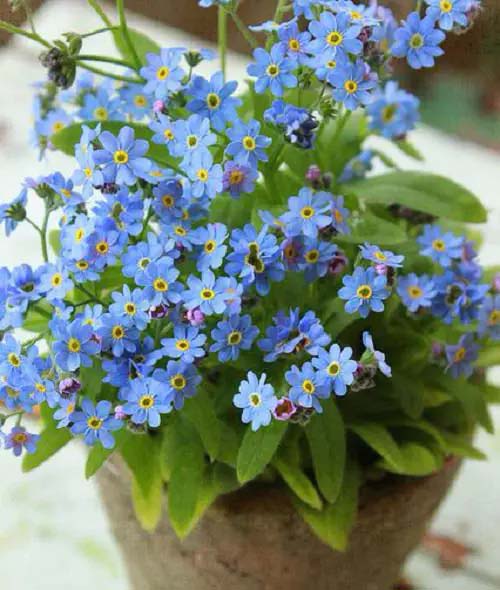
This is an annual flower that prefers a cold climate.
Typically used for rock garden landscaping, the gentle plant also looks and feels great in a container.
16. Geranium
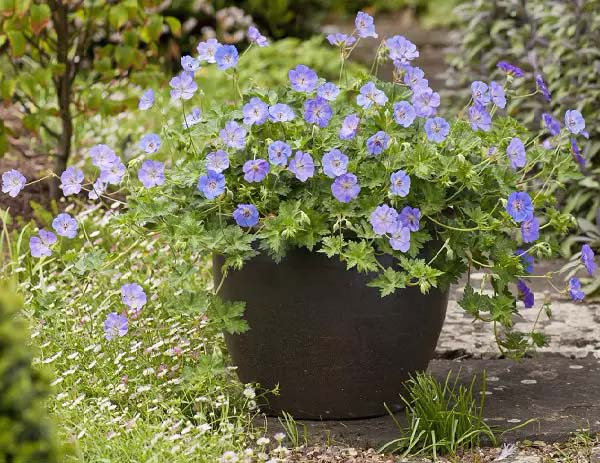
The cranesbill can delight your eyes for a long time all year round. There are many varieties of them that bloom in blue – geranium ‘Rozanne’ and ‘Johnson’s Blue’ are two of the best known.
This plant does not require much care, just regular watering. It can be hung in baskets or placed in containers and placed on the porch.
17. Grape hyacinth
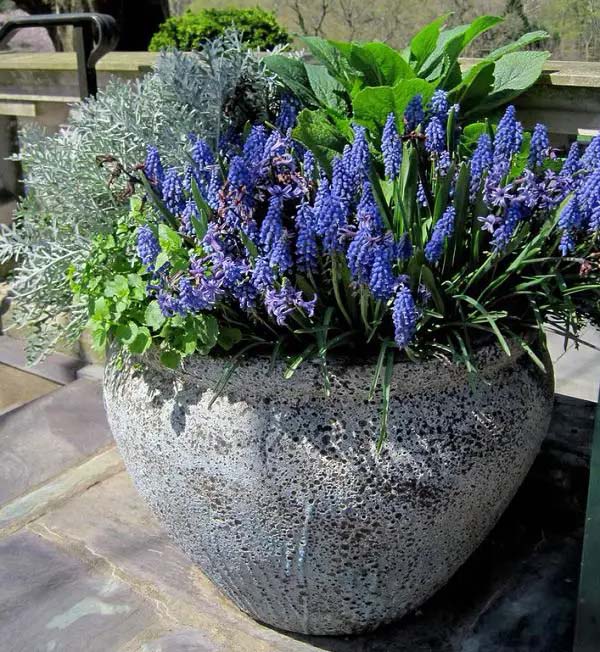
This flower blooms in spring with tall blue flowers and is therefore sometimes confused with lavender. It is an easy plant to grow and grows quite tall.
This makes it well suited to a floral arrangement to create a cascading bouquet, or it can be grown individually forming a clump with tufts of lilac peeking out.
It prefers sun or partial shade and moderate watering.
18. Himalayan blue poppies
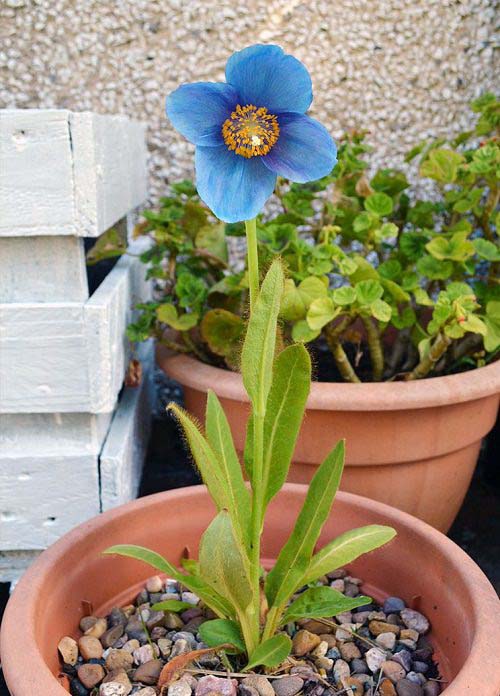
This flower is also known as the queen of Himalayan flowers.
Planted in a container, it grows tall and displays a large blue flower with yellow stamens. It likes well-drained soil and regular watering.
19. Hydrangea
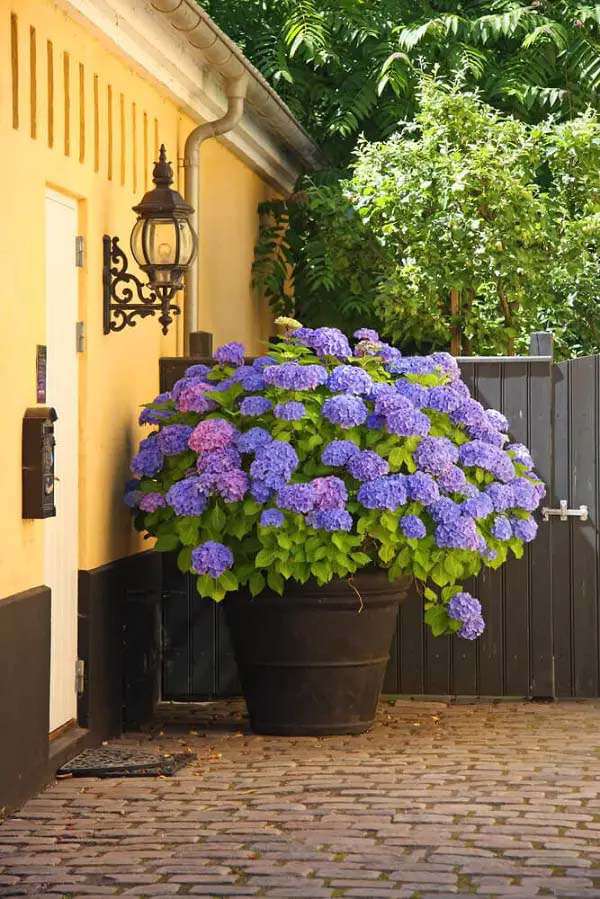
Did you know you can turn a plain white hydrangea blue by adding plant-friendly sulfur to the soil?
The flowers immediately turn blue. Growing in containers is not impossible, but you need to choose the largest ones.
The hydrangea likes the morning sun but feels burned by the afternoon heat. That’s why you should water it well.
20. Irises
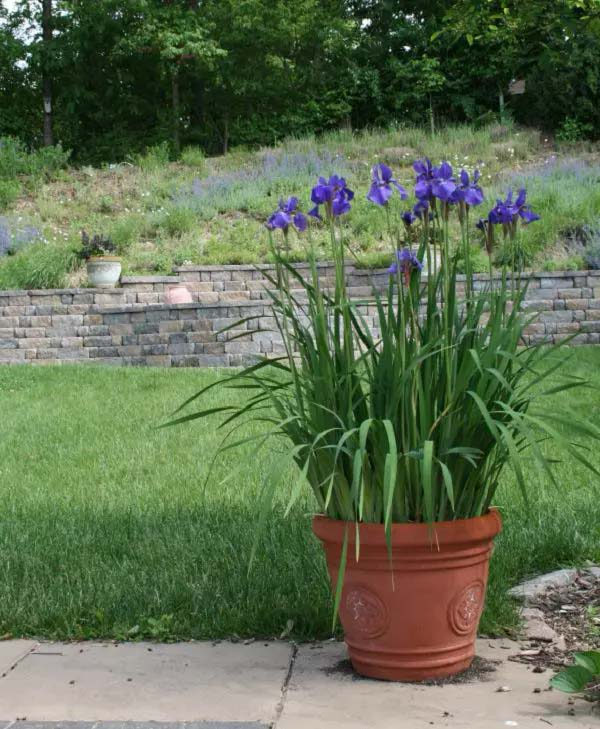
Although irises look like an easy plant to care for, they prefer a temperate to cool climate. Their colors vary, but the most impressive is blue.
To grow them in containers, all you need to do is provide them with enough space and sunlight.
21. Japanese gentian
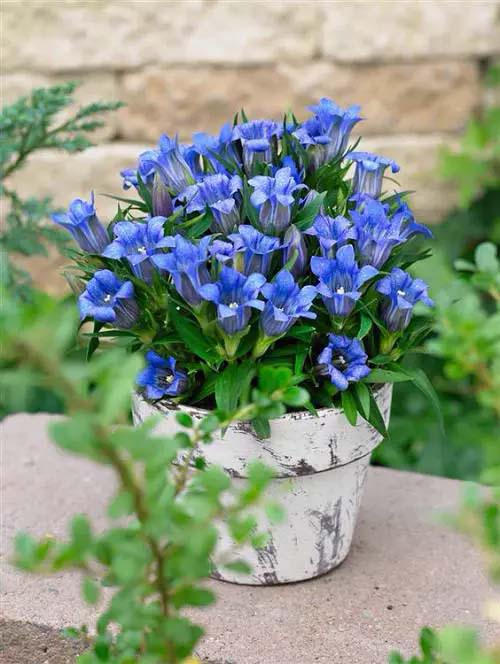
The color of these flowers is true blue. Gentian blooms from May to September and feels great planted either directly in the garden or in a container.
22. Lead plant
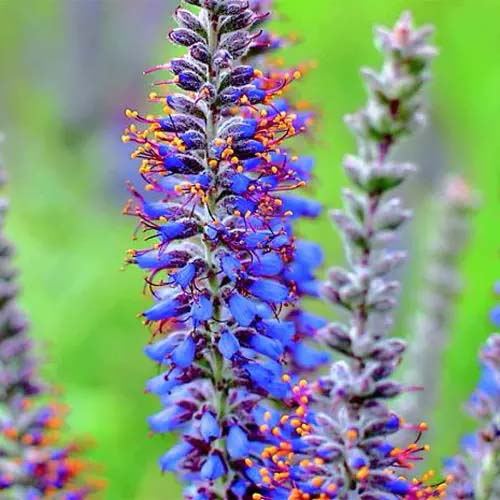
The downy indigo bush has tiny purple to blue bells growing above a stem. They are quite tall, making them a good choice for flower pot arrangements.
Its foliage is gray, which makes the blue flowers stand out in an amazing way.
23. Lily of the Nile
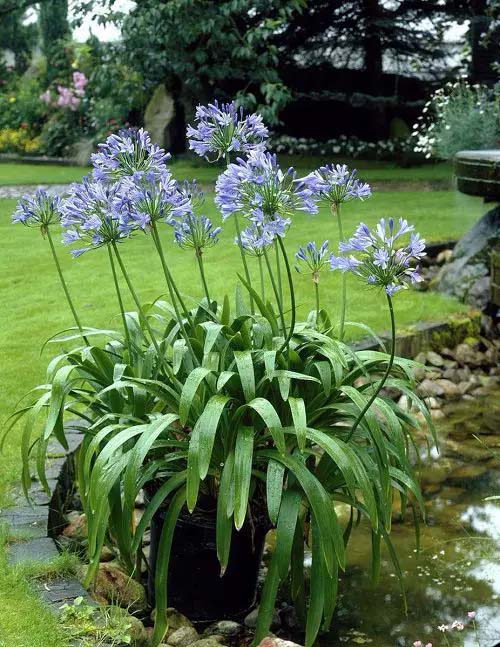
The Lily of the Nile is very exotic and gives the same feeling when planted in a container. For good growth it requires moisture, fertilizer and well-drained soil.
24. Lobelia
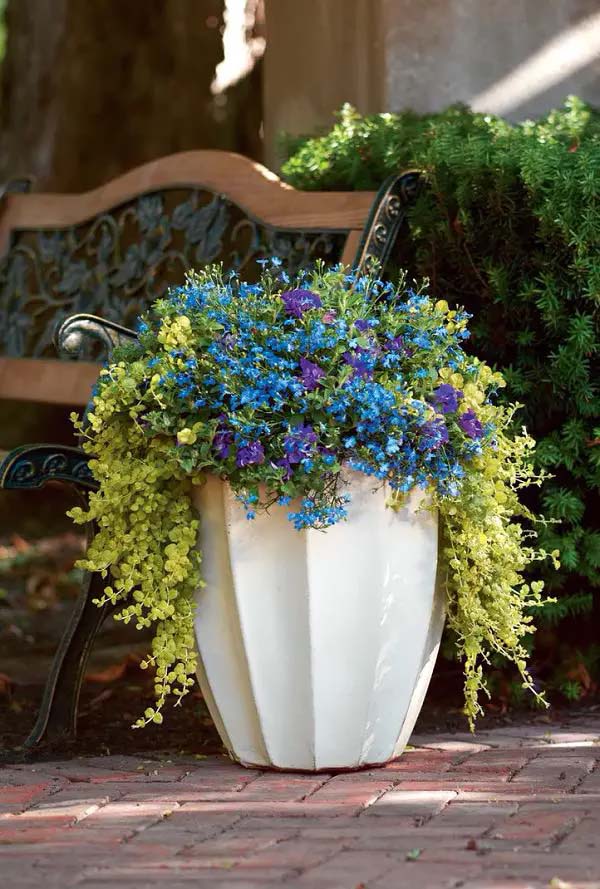
Lobelia is an annual plant that comes in a variety of white and blue flowers.
It is one of the preferred flowers for growing in containers because it creates a waterfall effect. It feels at home in small containers, in large ones in combination with other species and also on the ground in rock gardens.
25. Monkshood
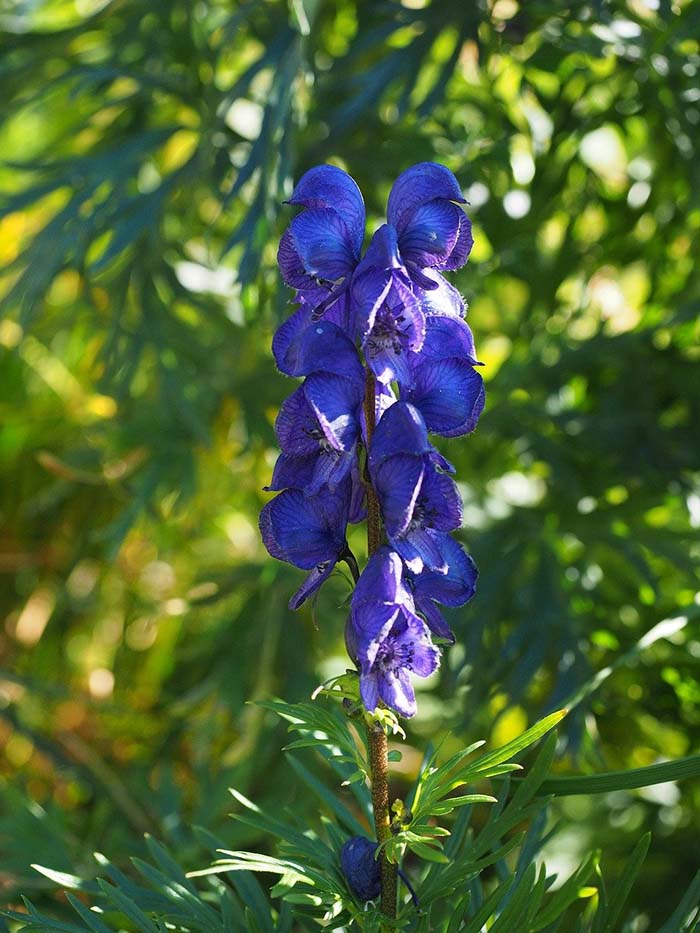
This blue flower is rare and deserves a special place in your potted plant collection. It grows 2 to 4 feet tall and blooms from late summer to early fall.
The foliage is light to dark green and the flowers are violet-blue.
26. Morning Glory “Heavenly Blue”
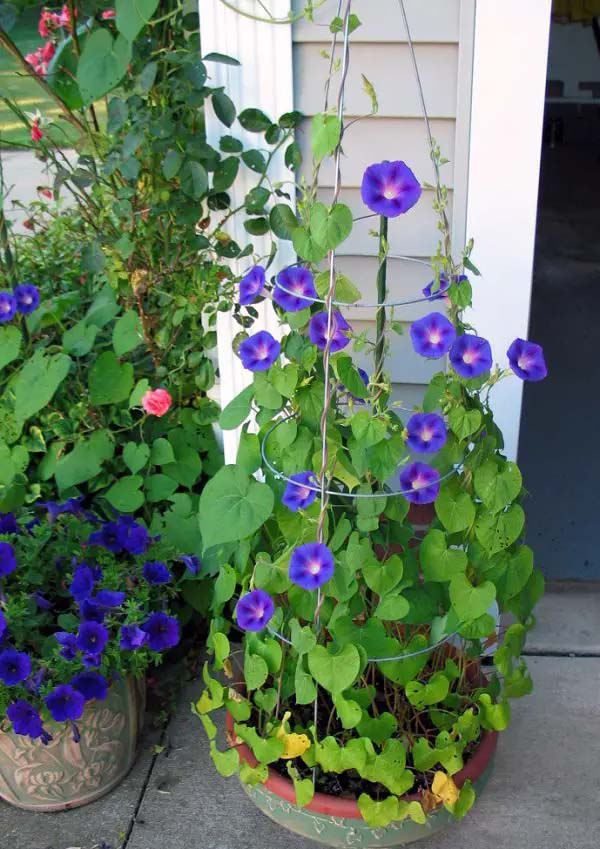
This flower has a true blue color and is one of the easiest flowers to grow.
Growing it in a container simply requires a good spot where there is support for it to climb.
27. Petunia
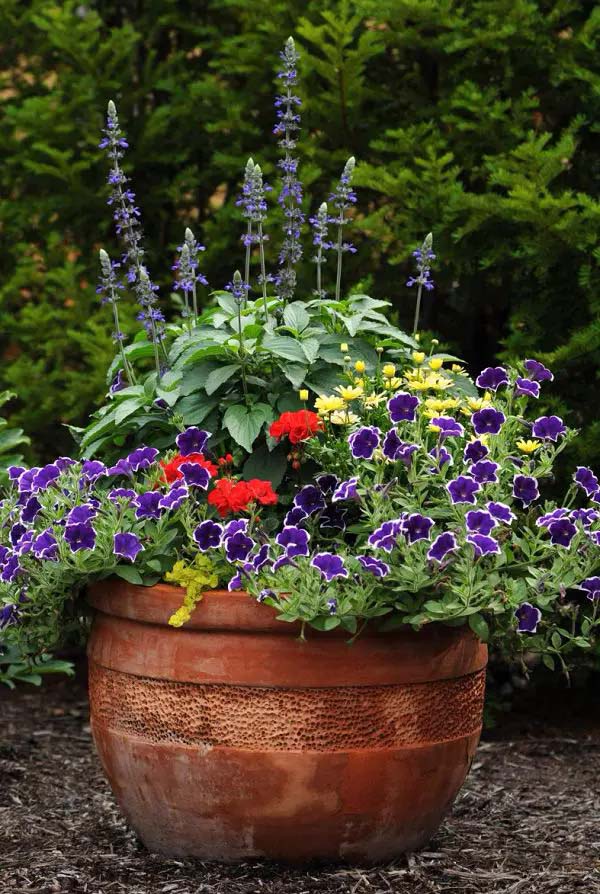
Petunias can be grown in any climate and that’s not the only reason why they are so popular.
It offers fragrant flowers in almost all colors that can be grown in hanging baskets or pots. T
28. Pincushion flower
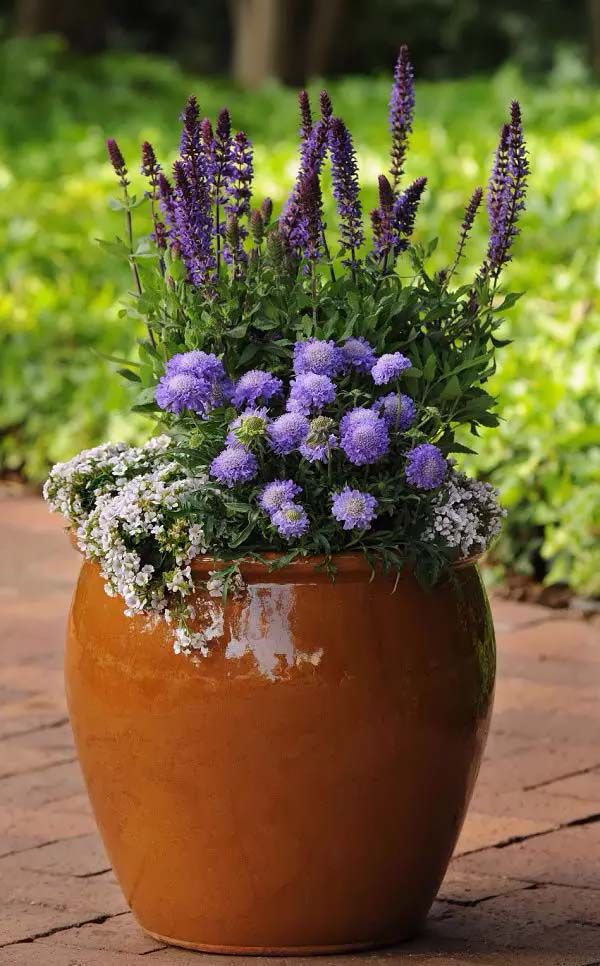
The pincushion flower or scabiosa is another unpretentious flower.
If you live in a moderately warm climate, it needs full sun. If you live in a hot climate, provide partial shade. This means you will be able to enjoy the splendor of the flowers for a whole season.
29. Plumbago
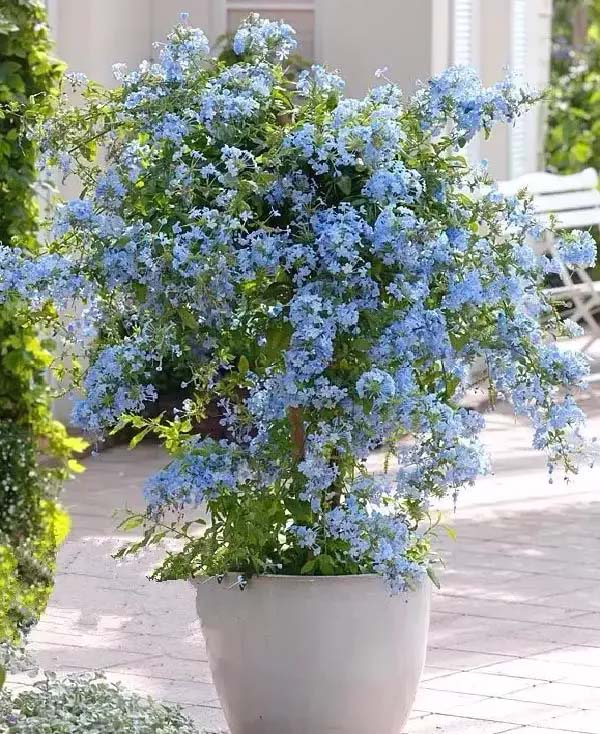
As a foundation plant, plumbago requires full sunlight and moderate watering when the soil feels dry. It can be saved for next season if stored indoors in winter.
It’s worth it because you can grow it to the size of a bush with fascinating baby blue flowers peeking out from it.
30. Rose of Sharon
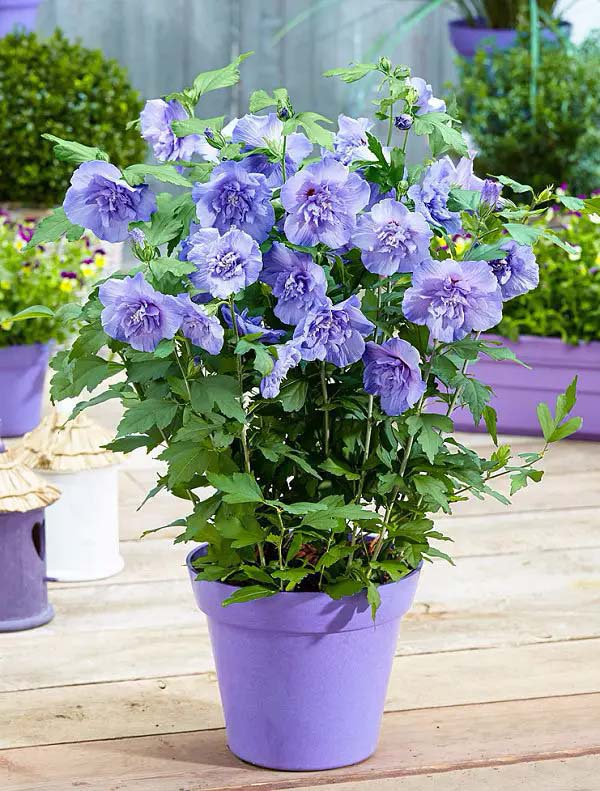
This is an ornamental shrub that has quickly become a favorite plant for many people. The blue flowering varieties are Blue Bird, Blue Chiffon and Blue Satin.
If cared for well, it can grow up to 10 feet tall and form a shrub. Make sure you transplant it into a suitable container that is appropriate for its size.
31. Salvia
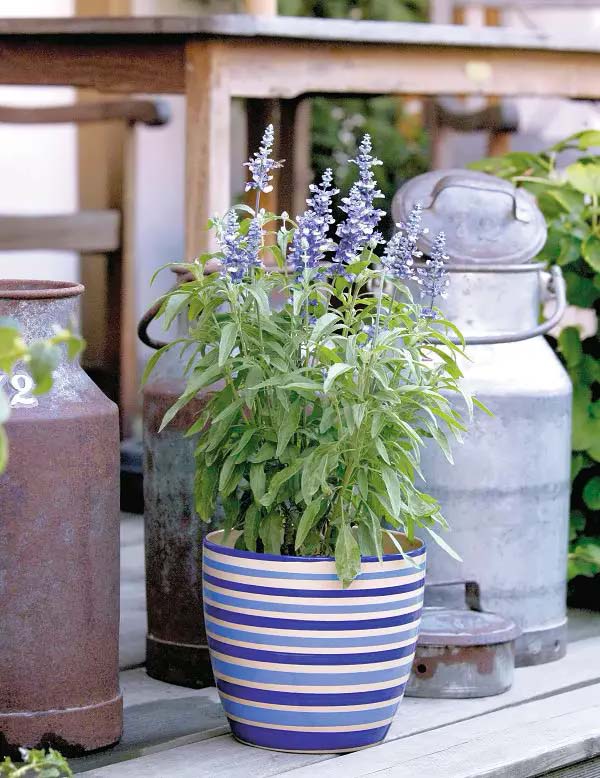
Salvia is a medicinal plant that also looks great. To grow as a perennial plant, it likes warm tropical weather. When grown in colder areas, it becomes an annual plant.
The vessels suitable for development are medium in size.
32. Sea holly
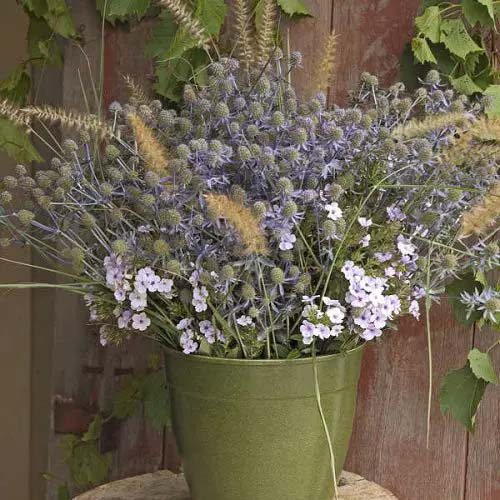
The beach holly blooms in summer and grows up to 15 to 45 centimeters tall under suitable conditions.
It likes sandy soil and full sun, where it can develop comfortably.
33. Summer snapdragons
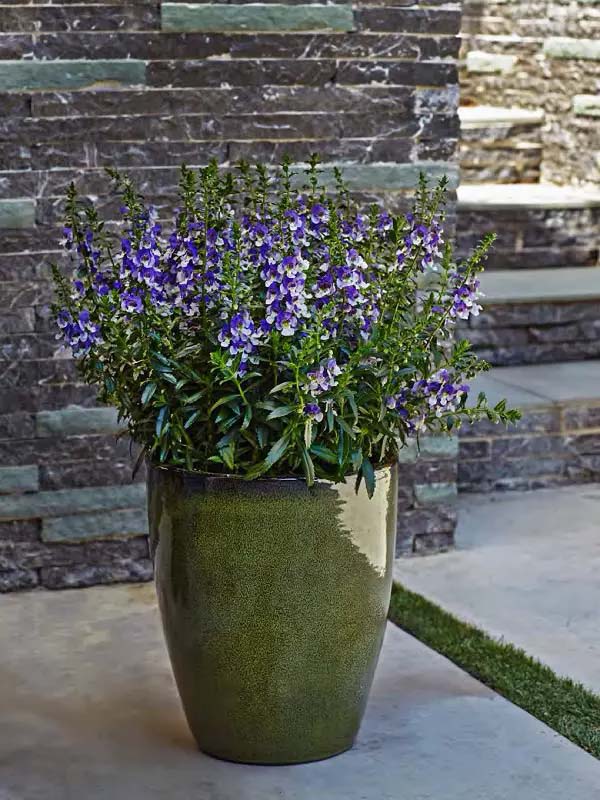
Both as a perennial and as an annual plant, the Angelonia thrives excellently on hot summer days. It blooms in colors of white, red, purple, pink and blue.
34. Swan River Daisies
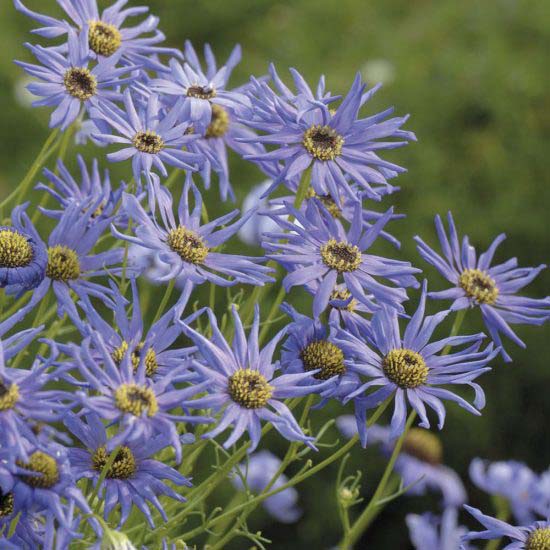
This is the Australian daisy with large blue-purple flowers. With moderate watering, it can delight you with its magnificent flowers for a long time.
35. Viola/Pansy
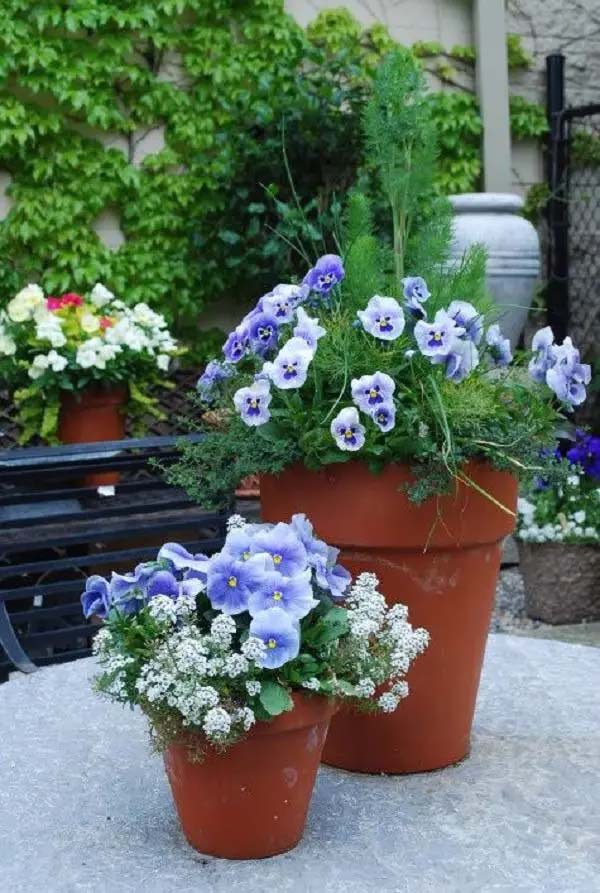
Viola comes in many colors and you can create a unique floral collage from the variety. They bloom in spring and enjoy company even when grown in a container.
36. Virginia Bluebells
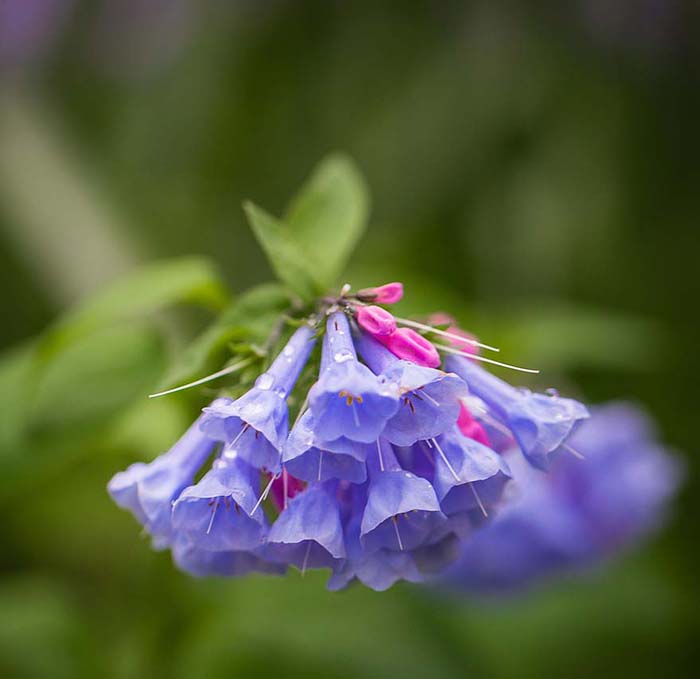
This plant forms large clumps with bells that attract butterflies and bees.
If planted in a pot, it needs organic fertilizer and a sunny to partially shaded location.
 careyfashion.com Carey Fashion
careyfashion.com Carey Fashion
































